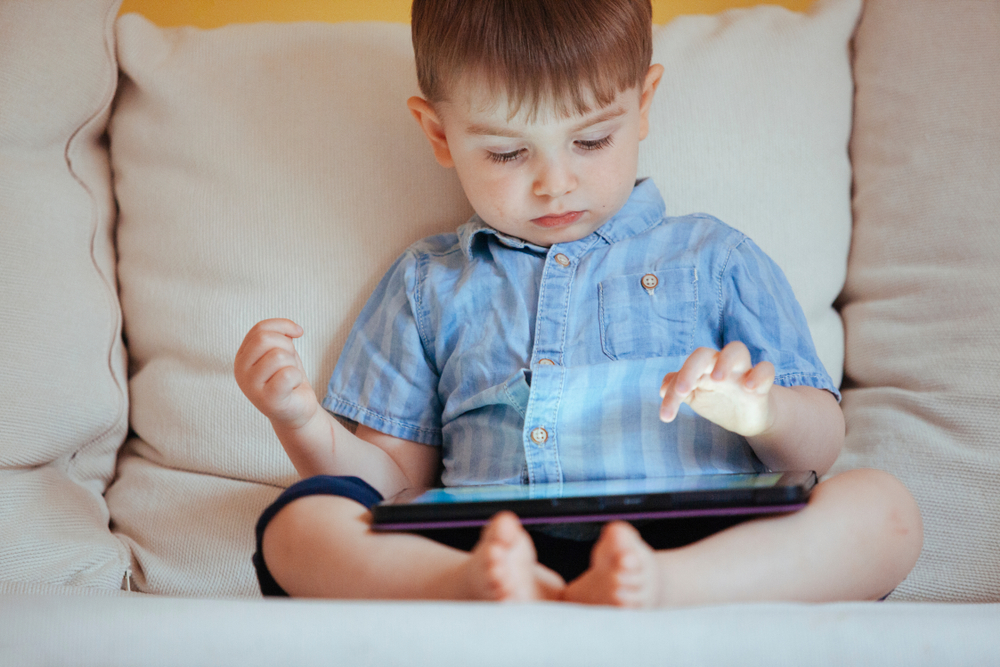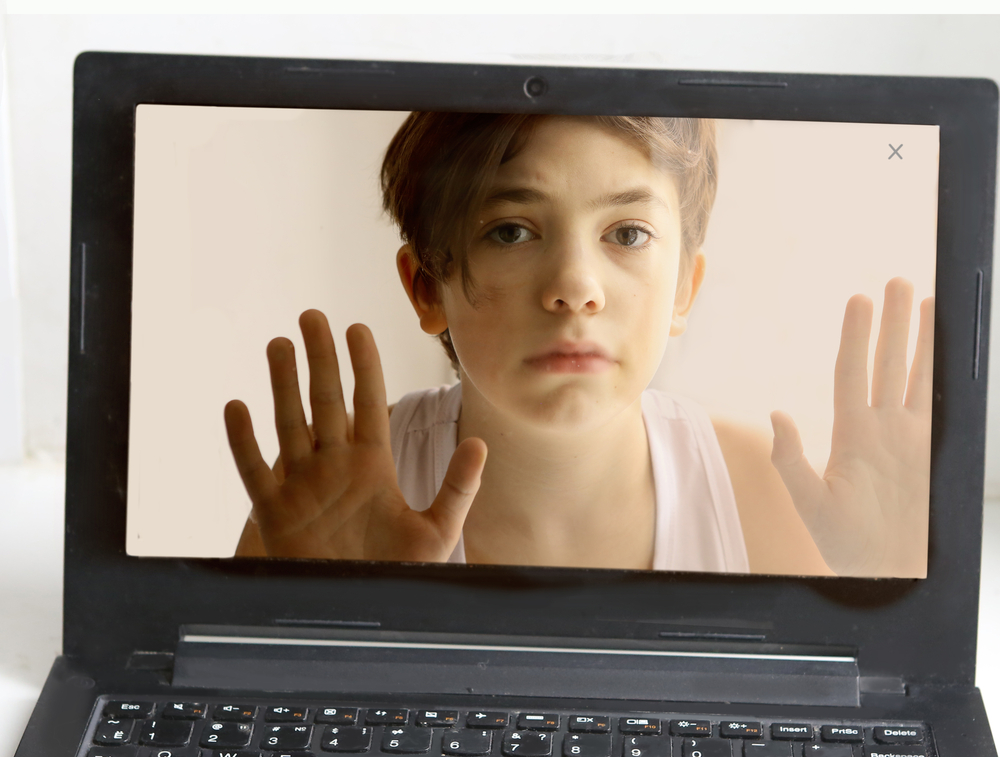Millie is at a lunch to celebrate her grandma’s birthday, yet while the rest of the family chat and eat, the 13-year-old is glued to her phone, watching Tik Tok videos and messaging her friends. When her mum Caroline asks her to put the phone away, the teenager storms off from the table, abandoning her lunch, to continue her browsing in the toilets.
‘She is absolutely attached to her phone,’ Caroline says. ‘She would prefer to go hungry and offend people before putting it away. She doesn’t hear a word we say. She doesn’t care about people in real life, just what they’re posting online. On the rare occasions we’ve prised her phone from her, once she’s got over it, she’s been a nicer child. She’s engaged with us and talked to us. She’s been pleasant and present. But it’s not worth the rows to take it off her all the time – we just need a way to help her go screen free.’

Caroline isn’t alone in her efforts to get Millie to cut down her screen time. There are some startling figures emerging about children’s time on tech globally and the effect it’s having. Most eight to 12-year-olds spend between four and six hours in front of screens daily – this increases to nine hours a day during the teenage years. Around 95 per cent of teens now have access to a smartphone, and 45 per cent say they are online ‘almost constantly’.
In China alone an estimated 20 million youths are screen-addicted and Internet Addiction Disorder is now one of the leading medical problems, while South Korea has more than 400 tech-addiction rehab centres.
And it isn’t just our children who are going square-eyed. We adults are guilty too. One study reveals that the average UK person spends up to 6.4 hours a day on the internet using a device – that’s almost the equivalent of a day’s shift at work. And a survey by dmg events Middle East revealed almost three quarters of UAE residents say they couldn’t live without their laptop or smartphone, with more than half spending up to Dh10,000 a year on technology and a further 15 per cent splurging Dh15,000 annually.
Internet Addiction Disorder
But, according to US-based addiction expert Dr Nicholas Kardaras, adults are better equipped to handle screen exposure because their frontal cortex is fully developed, though they are still at risk of increased depression and heightened anxiety as a result. Sadly, children are neurophysiologically less able to cope with too much screen time, leaving them more likely to suffer from sleep deprivation and irritability, as well as poorer grades at school and more behavioural problems.
In China alone an estimated 20 million youths are screen-addicted and Internet Addiction Disorder is now one of the leading medical problems facing the country, while South Korea has more than 400 tech-addiction rehab centres.
Dubai-based life coach Adam Zargar accepts keeping children like Millie off their screens is a challenge that starts early in life and one he witnesses only too often.
‘We are all very dependent on screens, whatever our age,’ says Adam, who’s Director of UAE Coaching. ‘They’re everywhere. We have televisions in our living rooms and bedrooms, computers, laptops and iPads in our homes and workplaces, and film screens in our cars and on trains and planes. Even our schools have replaced whiteboards and blackboards with screens.
‘And they’re very useful. We can order fast food in restaurants, scan barcodes, pay for parking – all the information we need is just a few clicks away on our phones or iPads. During the pandemic, they have allowed schools to continue teaching, people to hold virtual work meetings, families and friends to stay connected. Even medical appointments have taken place online.’
‘After several hours on a screen, children are like zombies – they become possessed and don’t want to unplug. They’ll do anything while watching a screen including eating food they don’t like’
But despite the huge advantages, there is a downside to our technology use.
Tech Zombies
‘After several hours on a screen, children and teenagers are like zombies,’ says Adam. ‘They become possessed. They don’t want to unplug. They want more of what they’re doing – more cartoons, more social media, more games. My three-year-old son Alexander is definitely like this – to the point he will do anything while watching a screen, even eat food he doesn’t like. I’ve seen young clients and my friends’ children go into trance-like states when they’re on their tech.

‘Too much screen time is making children socially awkward. They’re losing the skillsets of engaging in small talk, connecting with other people and playing. And because they’re not moving and using calories, all this screen time could lead to obesity.’
Screen Free Week
Earlier this month 30,000 people from all over the world, from Nicaragua and Romania to Scotland and San Diego, took part in Screen-Free Week, an annual international campaign, celebrated on every continent except Antarctica, and most widely in the United States.
Set up in 1994 and originally known as TV Turnoff Week, it was taken over by Fairplay, a non-profit organisation dedicated to ending marketing to children in 2010 and renamed. Each year it’s hoped that thousands of families, schools, and communities around the world will put down their screens for seven days of fun, connection and discovery.

But with some parents like Caroline struggling to get their children to unplug even for a family lunch out, let alone a day, surely a week is over-ambitious? Can any of us cope without looking at a screen even for just an hour? Most of us could use the excuse of work, and even our children can say they’re doing homework or study online.
‘Children who spent two hours a day or more looking at screens were 7.7 times more likely to meet criteria for a diagnosis of attention deficit hyperactivity disorder than children who watch for less than 30 minutes’
Lucy Kidwell, Screen-Free Week co-ordinator, confirms screen time is linked to obesity, violence, sleep problems, behavioural issues and reduced academic success.
‘Researchers from the Cleveland Clinic in Ohio found that by the age of five, children who spent two hours or more per day looking at screens were 7.7 times more likely to meet criteria for a diagnosis of attention deficit hyperactivity disorder than children who watched screens for 30 minutes or less each day,’ says Lucy.
‘Eighth graders who are heavy users of social media increase their risk of depression by 27 per cent, while those who play sports, go to religious services, or even do homework, cut their risk significantly.’
So how do we get our children to go screen-free, or at least cut down time spent on tech?
Celebrate going screen free
‘Focus on life beyond the screen,’ says Lucy Kidwell. ‘The point is to not just remove screens, but to replace them with meaningful activities that enrich our minds and bodies, such as spending time in nature, making art, writing a letter to a friend or reading. If we frame going screen-free as an opportunity rather than a chore, it can go a long way. Even better, see it as a celebration!’
Advance warning
Prepare your children by warning them a week or so before that you’ll be cutting back on screen time, suggests Adam.

‘If you tell them the week before, you’ll lessen the exposure,’ he says. ‘If they’re old enough, have a chat and brainstorm other things they’d love to do – games they’d like to play, places you might visit or activities they might try.’
Have boundaries
Whether you’re aiming to do a screen-free period or not, it’s good to have some boundaries around tech use in general, says US-born life coach Talane Miedaner, author of Coach Yourself to Success (McGraw Hill).
‘Have some house and family rules that you all stick to, like no phones at the table, and all phones must be left in the kitchen to charge after 8pm,’ she says. ‘Maybe you could designate one day a week as a screen-free day – have a rule that you can check your phones up to 10am, and then you go to the beach or for a hike with phones switched off.’
Use tracking apps
As a parent, keep tabs on how much your children are using their technology, and don’t be afraid to switch their phones off so they don’t work, says Talane, founder of www.lifecoach.com.

‘You can get apps that tell you how much your children are on their phones,’ she says. ‘Remember that you are their parent and you’re in charge.’
The American Academy of Paediatrics discourages media use by children younger than two and recommends limiting older children’s screen time to no more than one or two hours a day.
Reward being screen free
For young children, offer a reward when they achieve a skill that isn’t tech-related, suggests Talane.
‘Give a prize or a reward for every book they read, every story they write or painting they do. If they read a factual book, reward them with a fun book. Or count the hours you all spend on technology and the one with the lowest number wins a prize.’
Offer offline alternatives
There’s no point announcing a screen-free period and expecting children to make their own entertainment, says Talane.
‘Line up some fun activities, like going climbing or bowling, go and watch some sport or better still play some,’ she advises. ‘Go to a concert or the theatre, or head to the gym and work out as a family.’
Start them young
Good habits are formed when children are very young, so start as you mean to go on by encouraging your children to read books, says Talane.
‘If they go straight to screens, as many toddlers do these days, they’ll struggle with reading – it gets harder to read books if you’re used to screens,’ she says. ‘Read to them whenever you can, especially at bedtime, and get them to read books to you.’
Coping with screen free meltdowns
‘Make young children aware of what is going to happen in advance,’ suggests Adam Zargar. ‘Tell them that in five minutes you will be turning off the TV. Use a calm tone of voice and stay consistent. Recognise that your child might be frustrated and going through a type of withdrawal process. By being consistent with your request, it will get easier.
‘If they’re rude, let it pass as an emotional reaction, but talk to them calmly afterwards and hold them accountable for their behaviour then.’
Change routine
If, at the weekend, the whole family slumps in front of the TV, with phones in hand, and iPads on knees, shake it up, suggests Adam.
‘Get out and about. Go to the beach or go swimming. Go for a ride on the Al Qudra cycling track – there’s 86 kms for you to play with! Visit some indoor play areas, go paintballing or visit a coffee shop where you can play board games or snooker and pool. There’s so much to do, especially when the weather’s great.’
Teach tech responsibility
Talane warns against banning technology entirely throughout childhood.
‘Some parents think the answer is to not let their children have an iPhone but this just stores up problems for the future,’ she says. ‘When they leave home and go to university, they discover a whole new world of iPhones and other tech. Without parents to monitor their use of technology, teenagers will be enthralled with it, often missing lectures to stay in their rooms in a whole new world they’ve missed out on.’
Baby steps to going screen free
If going entirely screen-free for a week doesn’t happen, don’t beat yourself up, says Lucy Kidwell.
‘So often perfectionism can be the enemy of good effort,’ she says. ‘Sometimes we can’t go entirely screen-free and that’s okay. Especially after the challenges of the pandemic, it’s important to implement digital wellness however we can. Screen-Free Week is a time of intentionality, designed to raise awareness of our tech habits and how they affect our lives.
‘Even though it’s about turning off screens, Screen-Free Week isn’t about going without – it’s about what you can get! An hour once dedicated to YouTube becomes an hour spent outside; ten minutes whiled away on social media turn into ten minutes spent doodling; a movie on a rainy afternoon is replaced by time spent reading, chatting, or playing pretend.
‘Just put down those entertainment screens and do literally anything else! People are often surprised at what they find.’









